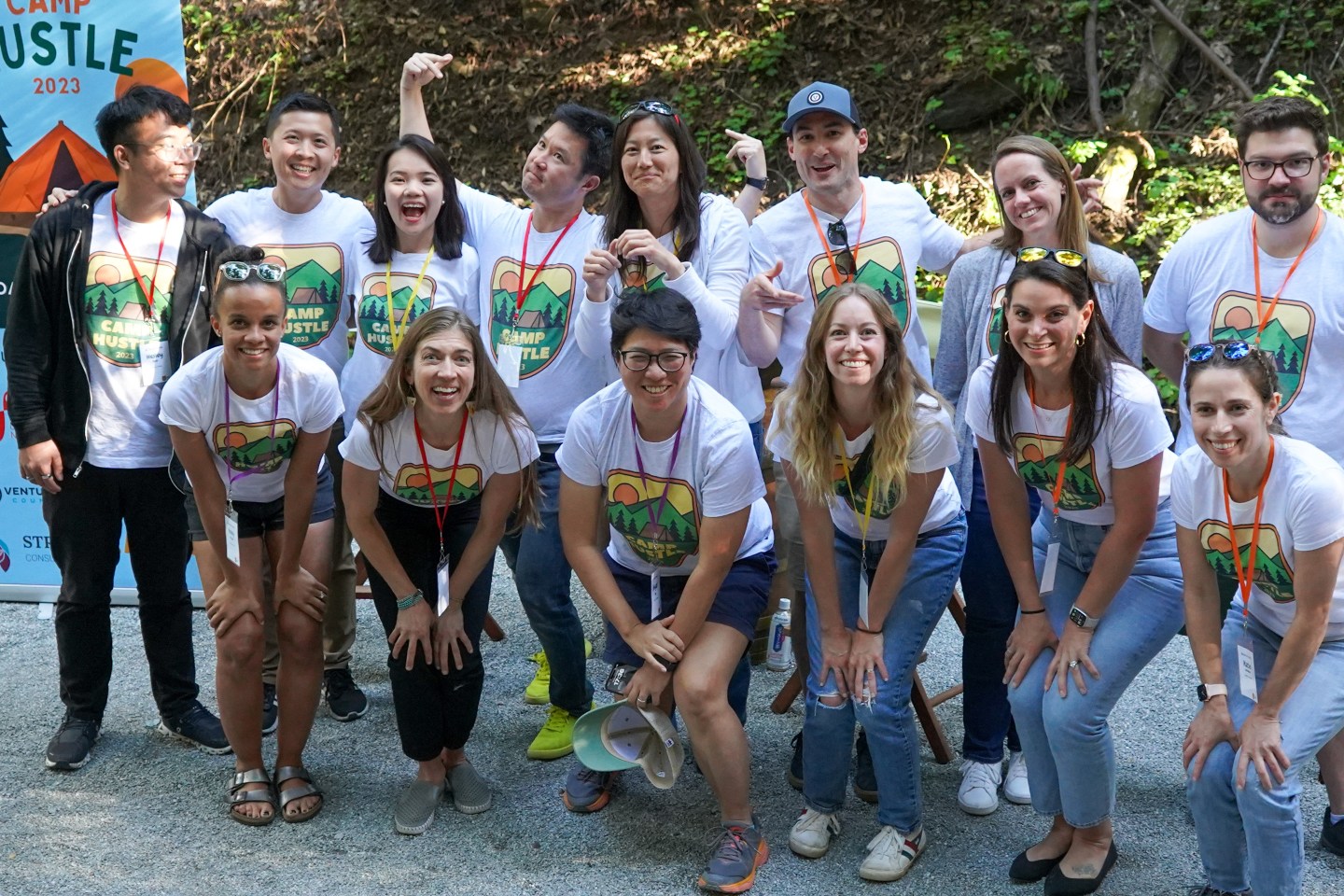Times are hard for startups trying to raise funding right now. They can be even tougher if founders don’t have a good pitch deck. Kera DeMars, head of marketing at pre-seed and seed-stage venture fund Hustle Fund, guest writes today’s Term Sheet to give founders a rundown of the biggest mistakes entrepreneurs make in pitch decks—and how to fix them.
One of the most powerful fundraising tools a founder has is their pitch deck. These decks are founders’ big chance to show investors why they’re worth backing.
I’ve seen thousands of pitch decks in my four years at Hustle Fund. But to be frank…most of them are terrible. And these terrible decks have something in common. Actually, they have five somethings.
Mistake #1: It’s too long
Pitch decks will never convince someone to invest in your company. But that’s not the goal. The goal of a pitch deck is to get a meeting with an investor.
That’s it.
You should be able to accomplish that goal in five slides. Here are the slides you need—with a couple of bonus slides for the rebels out there.
1. Team: Why is your team uniquely positioned to solve this problem?
2. Problem: Is it a big enough problem that people will pay for a solution?
3. Solution: What makes you different?
4. Market: Show us there is a big opportunity.
5. Traction: Tell us about your customer growth. Remember: anything is better than 0.
Bonus Slide:
6. Go-to-market strategy: What channels have you experimented with? What channels will you explore next?
Mistake #2: Ineffective ‘problem’ slide
Your problem slide should answer these three questions:
– What is the problem?
– How do you know it’s a problem?
– Who needs a solution?
Here is an example of an ineffective problem slide:
1. Airbnb hosts don’t know how to market their homes to travelers—This is a broad statement with no data to back it up
2. The average Airbnb is vacant 15 days/month—This doesn’t capture the importance of the problem
3. There aren’t tools for Airbnb hosts to increase their bookings—A quick Google search shows this isn’t true, which makes it appear you haven’t done your research.
Here’s how to fix it:
1. Include data from your customer research
2. Get specific! Including real numbers will make this slide extremely powerful
3. Remove any information about your product (this will come later)
Ta-da! Here’s our new, effective problem slide:
– We surveyed 300 Airbnb hosts and found 55% have vacancies for 15 days/month—Shows you’ve done your research
– The average Airbnb host loses out on $2,000/month because of vacancies—Quantifies the problem
– Existing tools don’t offer incentives for hosts to continue using the platform, so they have low retention rates—Explains why other companies are failing, and points to how your solution is different
Mistake #3: Lacking differentiation
It’s likely other companies are trying to solve the same problem as you. And when you have many companies going after the same audience, customer acquisition is hard. And expensive.
So you’ve gotta show investors what makes you different.
Let’s say I’m building a marketing automation platform. To make sure I stand out, I might say:
Marketing automation is crowded. The most successful companies focus on a specific audience.
– Hubspot is marketing automation for content creators.
– Hootsuite is marketing automation for social media.
– Marketo is marketing automation for SaaS.
My company, BookingPop, is marketing automation for Airbnb hosts.
By focusing on the most differentiated component of my business—the audience—I’m showing investors that I’ve discovered an untapped opportunity in my industry.
Mistake #4: Not including customer acquisition strategy
As an early-stage company, you might not have paying customers yet. And that’s ok.
But customer acquisition is a critical piece of your business. And your deck should address it.
The best decks include 2 pieces of information:
1. Marketing channels you’ve explored
2. Early results from your experiments
For example:
1. Webinars: 150 signups, 20% conversion
2. Free assessments: 100 signups, 10% conversion
3. Referral program: 20% increase in leads in 90 days
You don’t need to have many, many different channels.
Investors want to see that you’ve experimented with a few channels, and found one or two you can optimize.
Mistake #5: Lack of focus
I’ve seen too many decks that showcase all the different ways the company will make money. But investors want to see founders who are focused.
They prefer that your business does one thing exceptionally well rather than many things with mediocrity.
Why? Because at this early stage of your business, resources are limited. If you go after multiple opportunities at once, you’re spreading your resources too thin, and your primary product will suffer.
It’s critical that your pitch deck demonstrates focus. So if you have multiple products—or a bunch of features on the roadmap—keep it out of the deck.
By showing investors that your team is focused and aligned, they’ll have confidence you can successfully explore new opportunities in the future.
Submit a deal for the Term Sheet newsletter here.
Jackson Fordyce curated the deals section of today’s newsletter.
VENTURE DEALS
- Cohere, San Francisco- and Toronto-based A.I. platform for enterprise, raised $270 million in Series C funding. Inovia Capital led the round and was joined by NVIDIA, Oracle, Salesforce Ventures, DTCP, Mirae Asset, Schroders Capital, SentinelOne, Thomvest Ventures, and Index Ventures.
- Upstream Bio, a Waltham, Mass.-based inflammation treatment biotech company, raised $200 million in Series B funding. Enavate Sciences and Venrock Healthcare Capital Partners co-led the round and were joined by Bain Capital Life Sciences, Wellington Management, and others.
- Incline P&C Group, an Austin-based insurance program market services firm, raised $125 million in funding from Braemont Capital.
- EvenUp, a San Francisco-based generative A.I. platform for personal injury lawyers, raised $50.5 million in Series B funding. Bessemer Venture Partners led the round and was joined by Bain Capital Ventures, Behance founder Scott Belsky, and Clio.
- Shift5, a Rosslyn, Va.-based onboard data company for the aviation and defense industry, raised $33 million in additional Series B funding. Moore Strategic Ventures led the round and was joined by Booz Allen Ventures, JetBlue Ventures, and Teamworthy Ventures.
- Uncommon, a Cambridge, U.K.-based lab-grown pork food company, raised $30 million in Series A funding. Balderton Capital and Lowercarbon co-led the round and were joined by Red Alpine, East Alpha, Max and Sam Altman, and others.
- Pomelo Care, a New York-based virtual maternal and newborn medical practice, raised $25 million in Series A. Andreessen Horowitz led the round and was joined by First Round Capital, SV Angel, Operator Partners, Box Group, and others.
- Onfly, a Belo Horizonte, Brazil-based corporate travel and expense management software platform, raised $16 million in Series A funding co-led by Left Lane Capital and Cloud9 Capital.
- Parallax, an Edina, Minn.-based resource and capacity planning software company, raised $12 million in Series B funding. Baird Capital led the round and was joined by Rally Ventures and Grotech.
- Smiler, an Amsterdam-based company connecting photographers to visitors at tourist locations, raised $8.5 million in funding led by Octopus Ventures.
- Driver Technologies, a New York-based mobility tech company, raised $6 million in funding. IA Capital and CT Innovations co-led the round and were joined by Liberty Mutual Strategic Ventures, State Auto Labs/Rev 1, The Social Entrepreneurs’ Fund, ID8 Investments, C2 Ventures, and Kapor Capital.
- Monster API, a remote-based GPU infrastructure and pretrained A.I. models accessibility company for developers, raised $1.1 million in pre-seed funding. Carya Ventures led the round and was joined by Rebright Partners.
PRIVATE EQUITY
- Bain Capital Special Situations acquired a majority stake in KP Aviation, a Mesa, Ariz.-based aftermarket aviation materials and services supplier. Financial terms were not disclosed.
- BlackRock agreed to acquire Kreos, a London-based growth and venture debt financing provider to companies in the technology and health care industries. Financial terms were not disclosed.
- Firefly Aerospace, an AE Industrial Partners portfolio company, acquired Spaceflight, a Bellevue, Wash.-based orbital space vehicles provider. Financial terms were not disclosed.
- Schneider Geospatial, an Align Capital Partners portfolio company, acquired PeopleGIS, a Woburn, Mass.-based asset management SaaS solution provider for public works and permitting/licensing. Financial terms were not disclosed.
OTHER
- Wolters Kluwer Health acquired Invistics Corporation, a Peachtree Corner, Ga.-based software provider for drug diversion detection and controlled substance compliance. Financial terms were not disclosed.
FUNDS + FUNDS OF FUNDS
- Just Climate, the London-based investment business established by Generation Investment Management, raised $1.5 billion for a fund focused on reducing or removing emissions.
- Antler, a Singapore-founded venture capital firm, raised $285 million for a fund focused on investing in startups from Series A onward.
This is the web version of Term Sheet, a daily newsletter on the biggest deals and dealmakers. Sign up to get it delivered free to your inbox.












